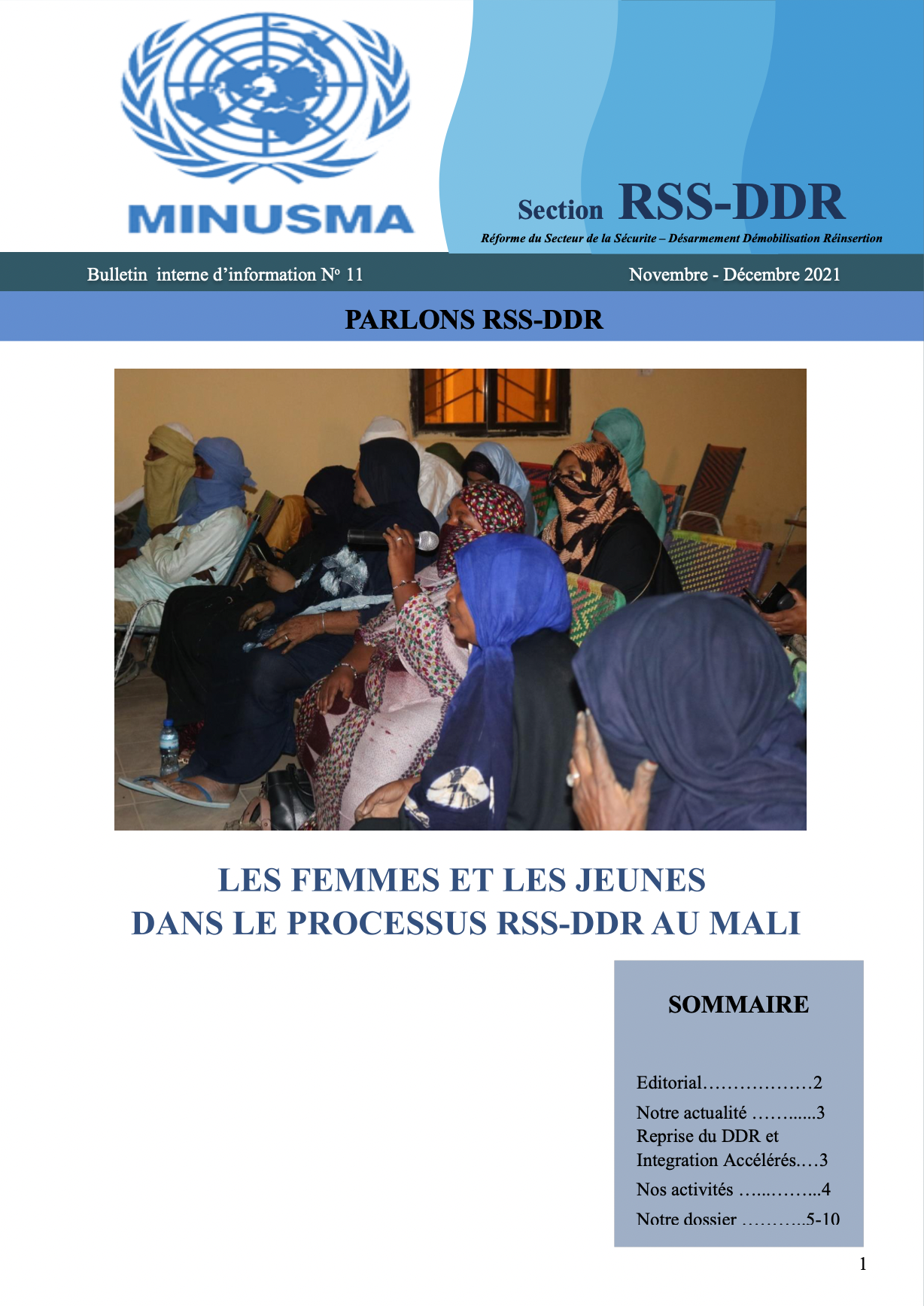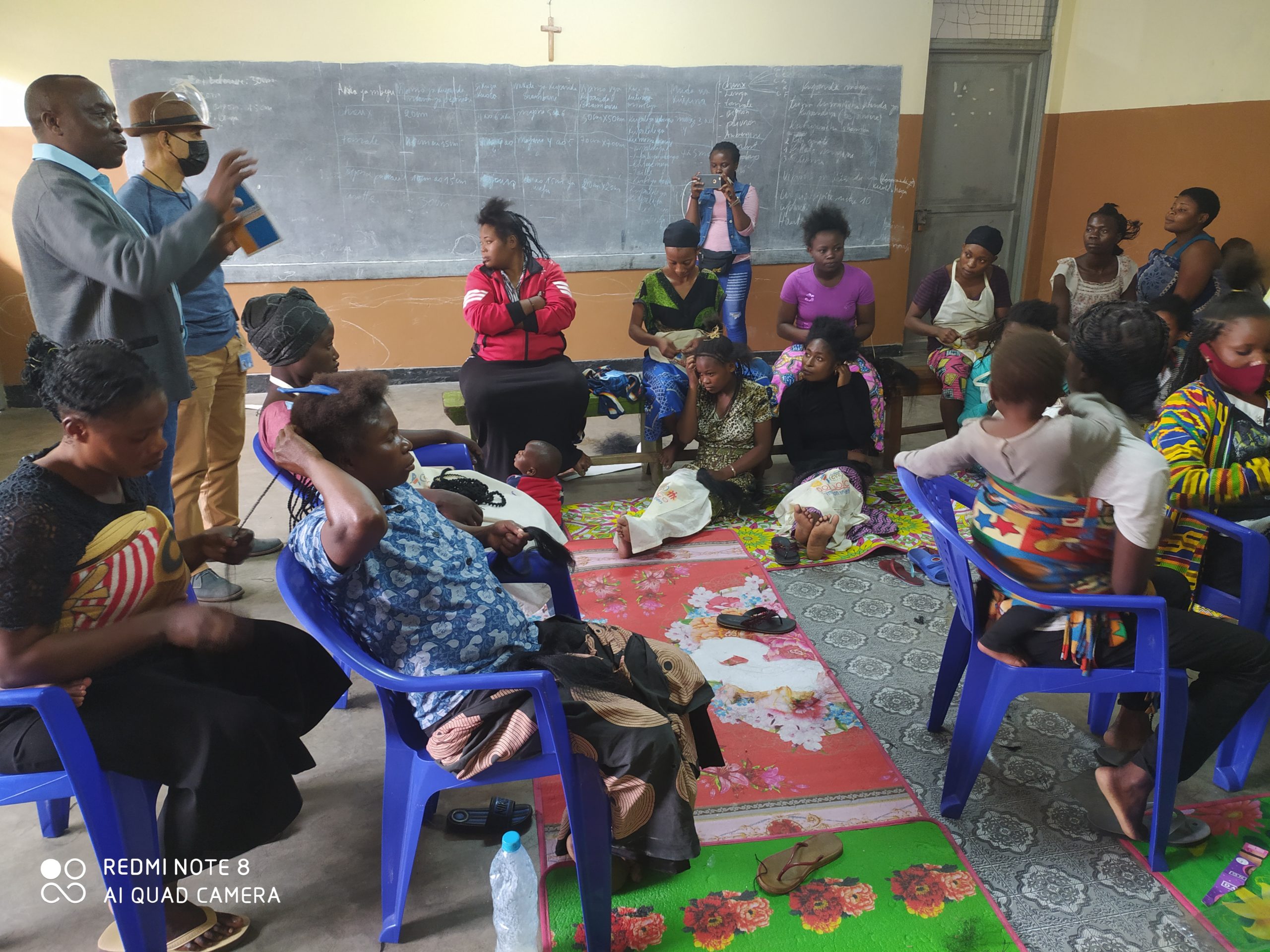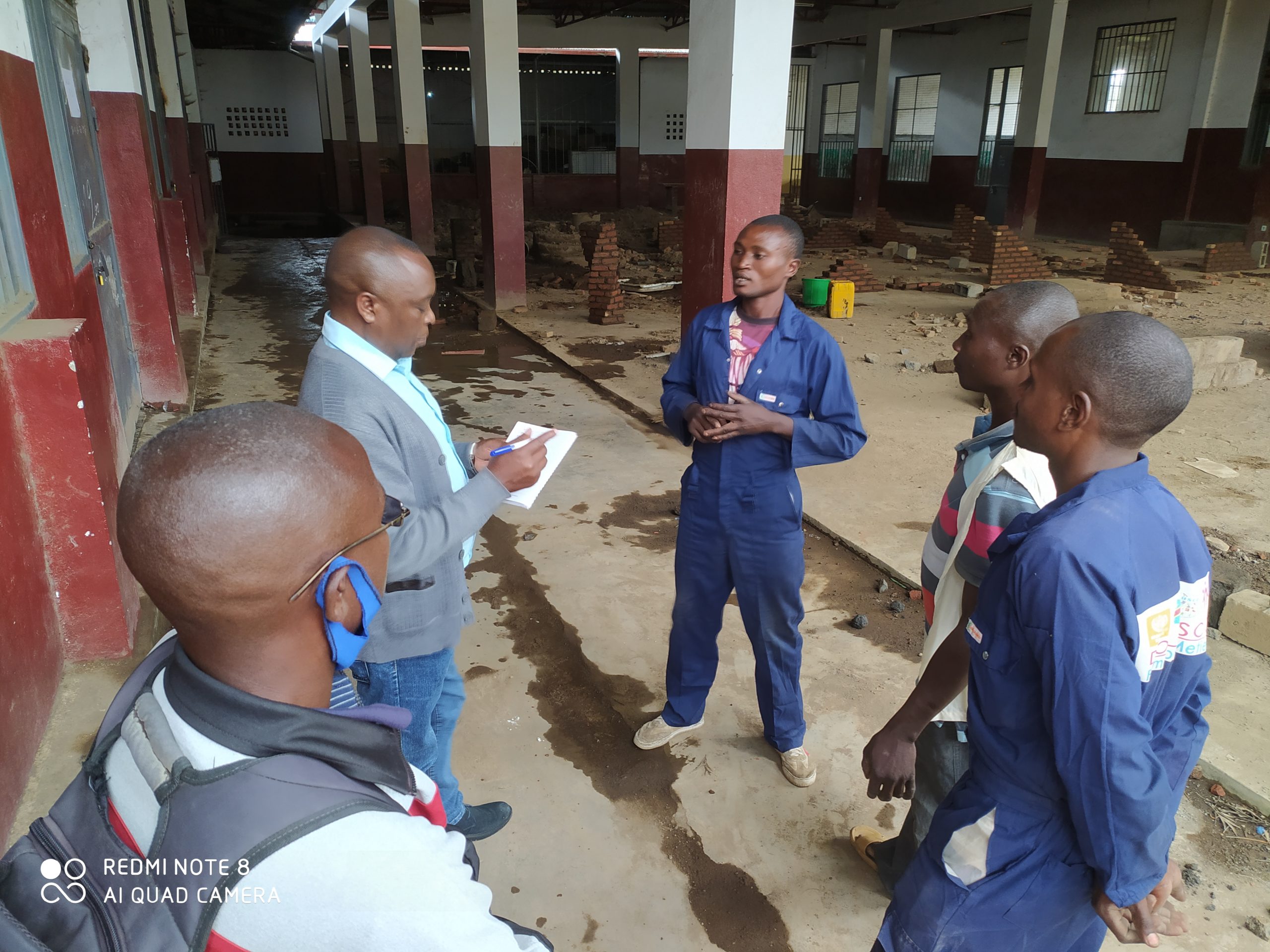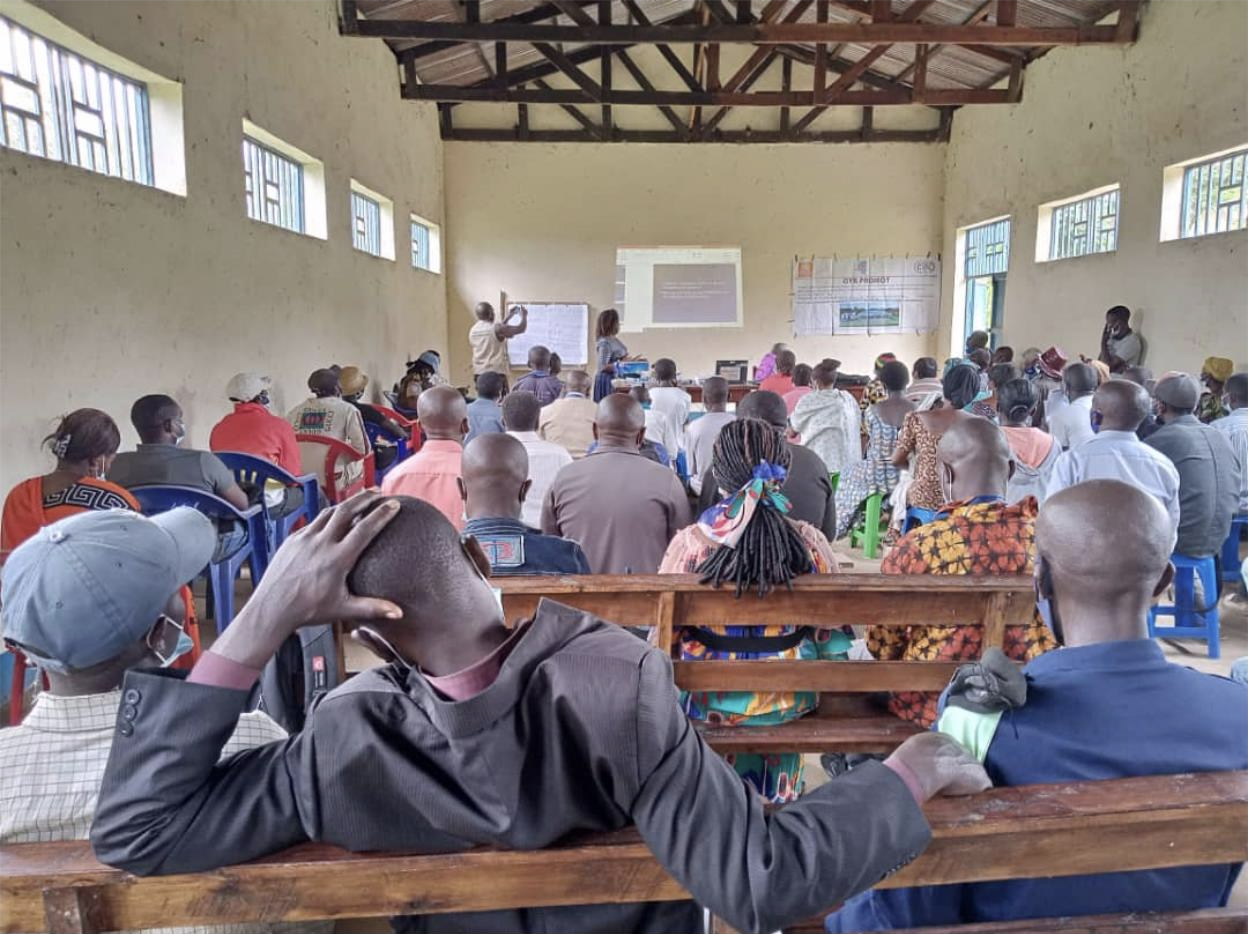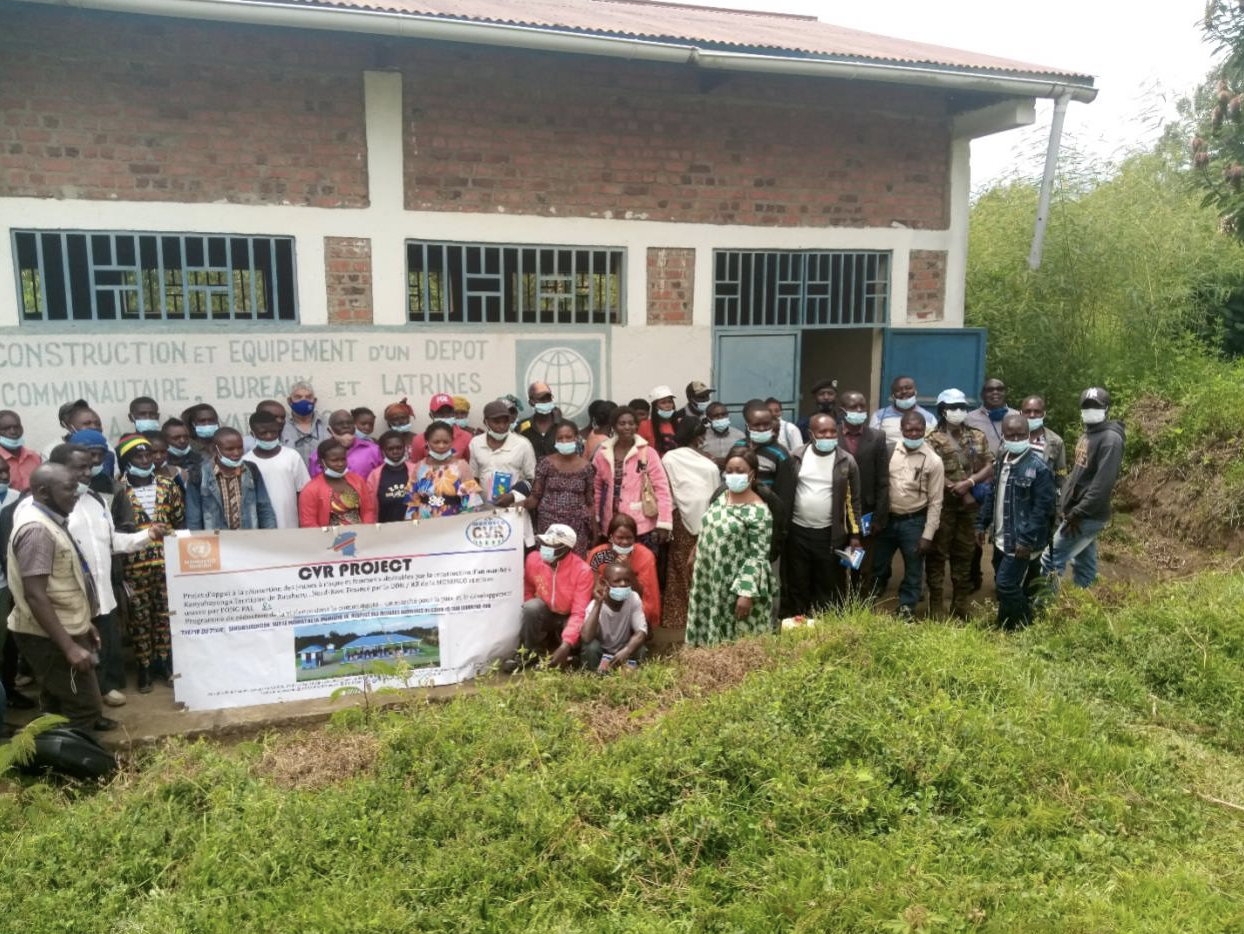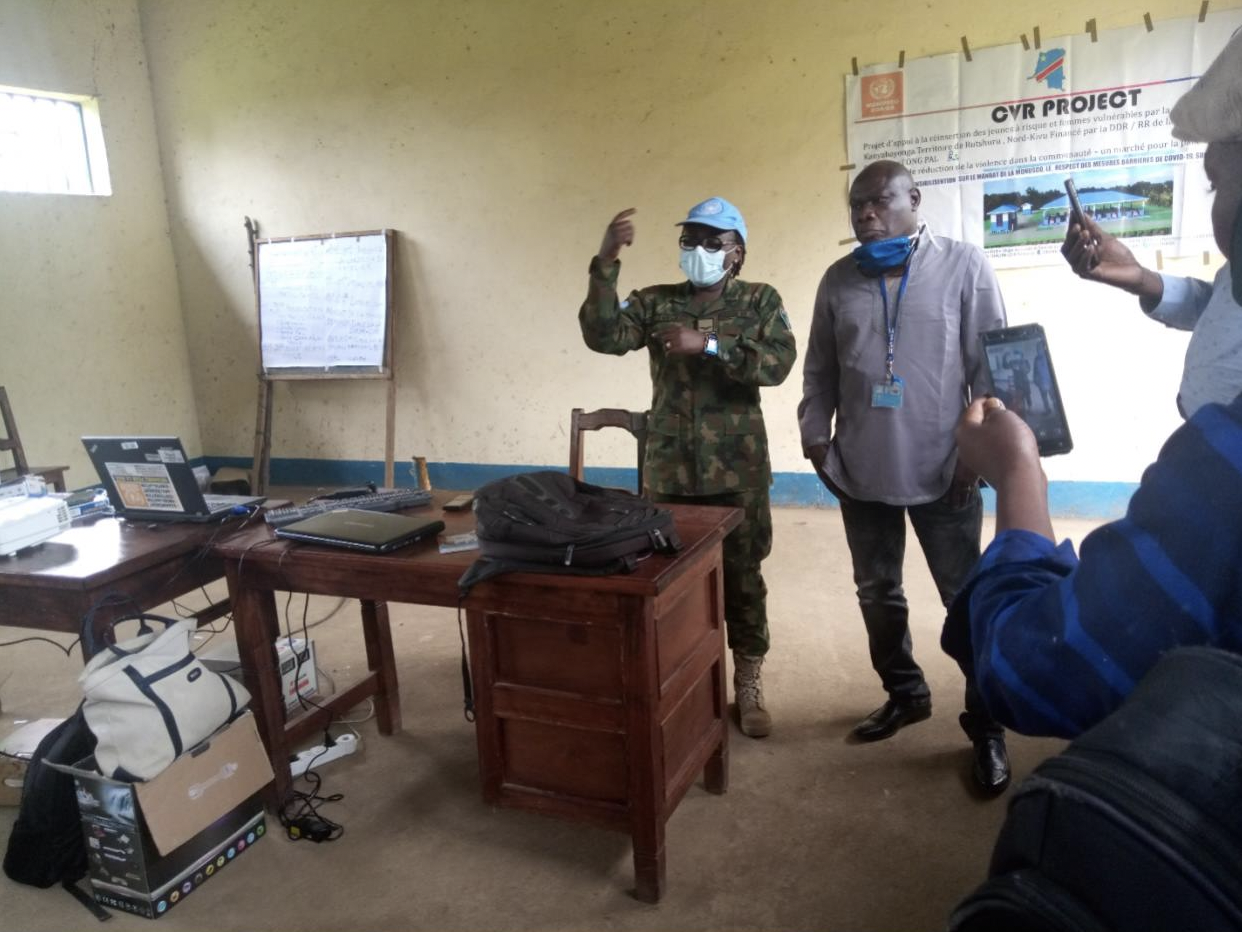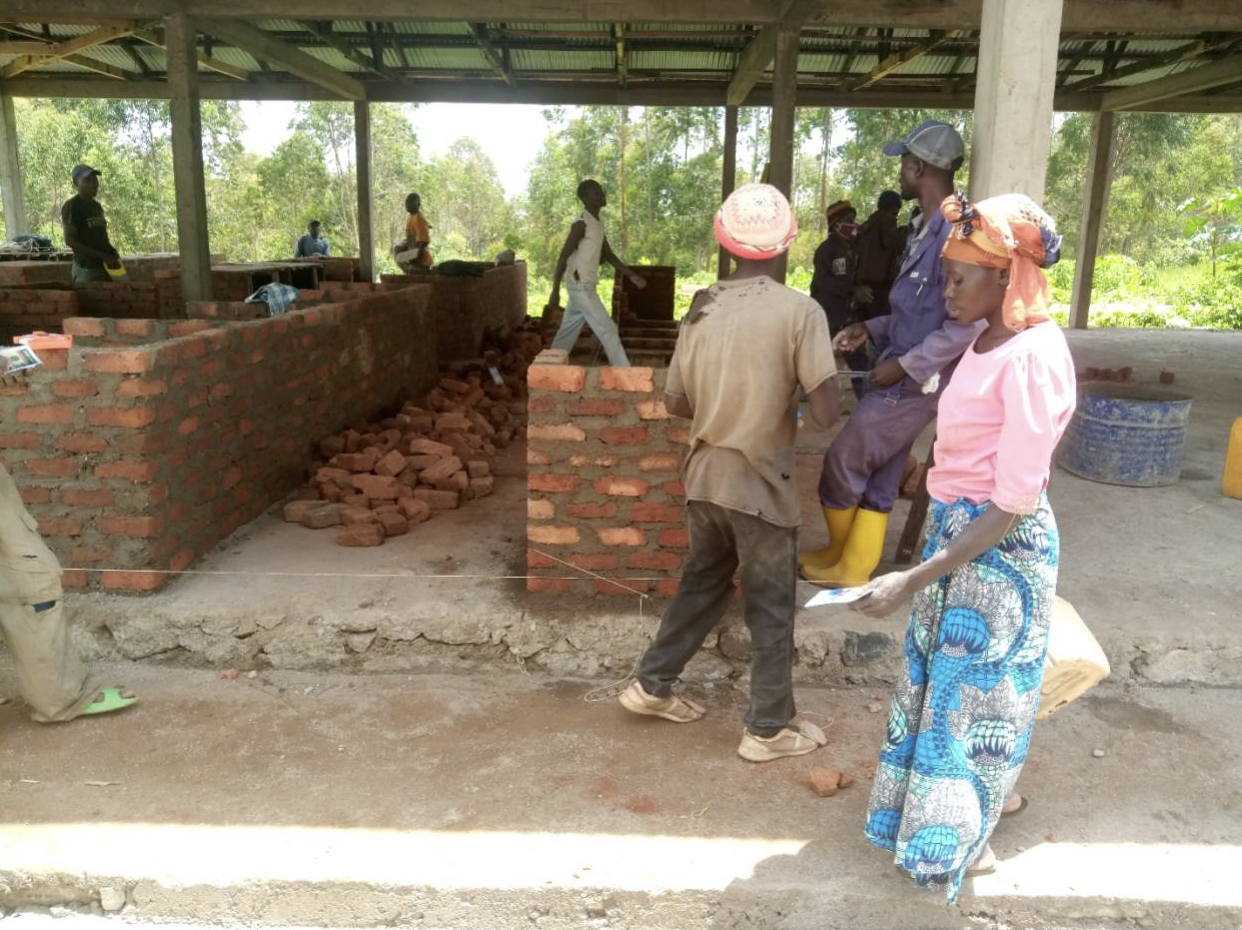CONTENTS
IN FOCUS: DDR PARTNERSHIPS
1.
MEMBER STATES AS PARTNERS
6.
DDR AND CLIMATE SECURITY
2.
MONUSCO PARTNERSHIPS HIGHLIGHT
7.
VOICES OF FORMER COMBATANTS
3.
INTERACTIVE MAP
8.
IDDRS UPDATES
4.
FIELD UPDATES
9.
RECENT PUBLICATIONS
5.
DDR AND POLITICAL TRANSFORMATION
10.
UPCOMING
HIGHLIGHTS FROM THIS NEWSLETTER ISSUE
BY DPO-DDR SECTION
 IOM and DPO enjoy a solid partnership both at the field and at the corporate level. Our community violence reduction and DDR efforts in places like the Central African Republic, Somalia and the DRC aim to bring sustainable changes to the lives of those affected by conflict and those wishing to lay down their arms and return to civilian life. We appreciate the strong support we received from DPO DDR Section for the rehabilitation programmes for women associated with Al Shabab and their communities of reintegration. This was a pioneering initiative addressing a long-overlooked need. We look forward to expanding this partnership as IOM’s peacebuilding portfolio continues to grow.
IOM and DPO enjoy a solid partnership both at the field and at the corporate level. Our community violence reduction and DDR efforts in places like the Central African Republic, Somalia and the DRC aim to bring sustainable changes to the lives of those affected by conflict and those wishing to lay down their arms and return to civilian life. We appreciate the strong support we received from DPO DDR Section for the rehabilitation programmes for women associated with Al Shabab and their communities of reintegration. This was a pioneering initiative addressing a long-overlooked need. We look forward to expanding this partnership as IOM’s peacebuilding portfolio continues to grow.
– Ugochi Daniels
Deputy Director General- Operations![]()
International Organization for Migration (IOM)
From the Voices of Former Combatants
CVR Projects in Mali, the DRC and CAR
IN FOCUS: DDR Partnerships

To this end, a core mandate of the DDR Section is to foster, maintain, and expand strategic partnerships at global level as well as support their operationalization in field settings. These partnerships leverage each organizations comparative advantage in a way that brings their technical expertise, local networks, financing and deployable capacities to bear at the request of national authorities. It is precisely this multiplier effect partnership, that allows for the provision of well-coordinated and mutually reinforcing technical assistance that promotes national ownership while supporting national institutions, as well as enhancing regional mechanisms and regional economic communities in line with the overall goal of promoting regional engagement.
Against this backdrop, this bulletin will highlight the myriad of partnerships that the DDR Section maintains. In this Issue of the DDR bulletin, you will learn about our strategic partnerships, their main objectives, as well as where they are active. Lastly, the issue will showcase voice from our most important partners: ex-combatants and community members.
DDR processes are implemented in a variety of contexts and working in complex environments such as eastern DRC requires a solid foundation of trust and partnership between UN and WB for program success down the line. Over the last 24 months this has been built up firstly through engagement with various teams within the UN, including the DDR section in MONUSCO and at Headquarters, on the difficult evaluation of the PNDDR III (from which a key lesson was the need for a strong partnership) and then in the extensive series of expert-led discussions on the current context, what has worked and what has not, lessons learned and what are the potential new directions to follow in the design for the new World Bank program.
– Bernard Horborne, World Bank![]()

The joint DPO-ODA project is also promoting sustained partnerships at the field level through the operationalization of a dedicated technical assistance mechanism. In Haiti, the deployment of a technical assessment mission on WAM in 2019, led to the facilitation of long-term partnerships between the United Nations Integrated Office in Haiti (BINUH), the United Nations Development Programme (UNDP), the United Nations Regional Centre for Peace, Disarmament and Development in Latin America and the Caribbean (UNLIREC) and the United Nations Institute for Disarmament Research (UNIDIR) to support Haiti in the establishment of a comprehensive arms control framework.
The joint DPO-ODA project was also recently shortlisted for the 2021 Secretary-General Award in the category of “Breaking the Silos”. For more information on the project click here to view a video produced by the project team.

Highlight: Partnership Yielding Positive Results in Mali
The SSR-DDR Section of MINUSMA is a joint section that brings closer alignment and partnership between DDR and SSR. The section aims to create and continue reinforcing existing partnerships with national, international, and local organizations and institutions with the objective of implementing DDR and CVR projects in northern and central Mali.
From 2019 to date, the Section has been working with its principal partners, the National DDR Commission (CNDDR), the Integration Commission (CI), and the Security Sector Reform Commission (CRSS). These Government organs were established after the signing of the 2015 Peace Agreement. MINUSMA through the SSR-DDR Section, has continued to provide these Government organs with technical, financial, and logistical support to ensure the DDR – Integration of 1735 ex-combatants currently forming part of the reconstituted Malian army already deployed. The three institutions, for example, have also been at the forefront of the transportation, training, and integration of these ex-combatants coming from the signatory armed movements. In addition, and with the required support of the Section, they have constructed the DDR camp in Menaka; rehabilitated the various Operational Coordination Mechanism (MOC) camps in Kidal, Gao, and Timbuktu as well as the transit camp in Bamako meant for the reconstituted army. Moreover, the section is expected to closely work with the European Union as a partner during this fiscal year. With EU’s financial support the SSR-DDR Section will contribute to the improvement of the living conditions of the reconstituted units of the national army (FAMa) in the various camps in Gao and Kidal.
In parallel, the SSR-DDR Section’s Community Violence Reduction Projects implemented in the north and center of Mali are implemented in partnership with local and international organizations. In addition, since 2019, the Section has fostered partnerships with nearly 30 local NGOs that operate in close proximity to beneficiaries and hence have easy access to project implementation locations that are deemed volatile. The projects are implemented in the northern regions (Kidal, Gao, Timbuktu, Taoudeni, and Menaka) and center (Mopti and Segou) of Mali. Some of the projects implemented by these local partners include vocational training, basic infrastructural rehabilitation, income-generating activities, lighting and security, agriculture, solar-powered water system, animal husbandry, etc. From 2019 to 2021, the SSR-DDR Section through the partnership of these NGOs, has implemented 52 CVR projects targeting 58,528 beneficiaries including 27,487 women in all but one region in the north and center of Mali.
Partnership in Support of the National Commission on Defense, Security, and Civilian Protection
MINUSMA supports national efforts for democratic control and oversight of the security sector, focusing on members of the National Commission on Defense, Security, and Civilian Protection (CDNSPC) and related committees. The SSR-DDR Section has continued to work with the National Democratic Institute, the Alliance pour Refonder la Gouvernance au Mali (ARGA-Mali) to support various workshops and training activities to provide the parliamentarians with the necessary tools for self-assessment of effective budgetary control on defense and security resources (financial, materials, and human). So far, 80 Parliamentary Assistants from all Assembly committees have benefited from this capacity building effort.
Partnership in Support of the Ministry of Religious Affairs and Cults
As of 2019, the SSR-DDR Section, along with the Countering-Terrorism Implementation Task Force (CTITF), have continued to financially and technically support the Ministry of Religious Affairs and Cult (MARC) in the elaboration and implementation of the National Policy on Prevention of Violent Extremism and Counter-Terrorism. The section through its implementing partner was involved in the construction and rehabilitation projects of offices; and the provision of office equipment, materials, and office furniture for the operationalization of two regional offices and two youth training and community centers in Mopti and Gao Regions. These projects aimed to support the Government’s National Policy and action plan to counter violent extremism and terrorism in Mali.
Partnership in Support of Civil Society
Since 2019, MINUSMA’s SSR-DDR Section has financially and technically supported the creation and operationalization of the Platform for Youth Engagement (PEJ/SSR-DDR) which has more than 50 youth associations in different regions of Mali including RENAJEF; Maliden; RENEDEP; ARGA-MALI; WANEP; Conseil National de la Jeunesse (CNJ); Association Ensemble des Jeunes Mali; Jeunes Chambre
MINUSMA Newsletter
Women and Children in Mali’s SSR-DDR Process
Partnership with the Permanent Secretariat for Small Arms and Light Weapons (SALW) counterproliferation
Through its partner, the SSR-DDR Section has conducted five outreach activities and one carnival in Bamako and in the center of Mali on the Small Arms and Light Weapons (SALW) counterproliferation, as well as the promotion of civilian voluntary disarmament. Additionally, the section partnered with the National Directorate for Borders Management to develop a national policy on borders which led to the revitalization of five border posts through the provision of equipment and furniture, among others. Furthermore, the National Directorate for Waters and Forests strengthened the capacities of 95 Forest Guards and FAMa soldiers on counter poaching and illegal transborder trafficking in Douentza region.
 WHO’s collaboration with the DDR section of OROLSI has been instrumental to WHO’s ongoing work to raise health’s contribution to the Humanitarian-Development-Peace Nexus, in recognition of the fact that conflict and health cannot exist in the same space. What began as a joint effort to define multi-sectoral pathways to DDR through the development of the IDDRS has since created the space and opportunities for health to make specific contributions to post-conflict recovery in countries, including through the reintegration of ex-combatants into the health workforce and the establishment of peaceful conditions that strengthen health and wellness. WHO looks forward to deepening this partnership with the DDR section as both our entities strive to “do more good” for those whom the UN system serve.
WHO’s collaboration with the DDR section of OROLSI has been instrumental to WHO’s ongoing work to raise health’s contribution to the Humanitarian-Development-Peace Nexus, in recognition of the fact that conflict and health cannot exist in the same space. What began as a joint effort to define multi-sectoral pathways to DDR through the development of the IDDRS has since created the space and opportunities for health to make specific contributions to post-conflict recovery in countries, including through the reintegration of ex-combatants into the health workforce and the establishment of peaceful conditions that strengthen health and wellness. WHO looks forward to deepening this partnership with the DDR section as both our entities strive to “do more good” for those whom the UN system serve.
– Aiman Zarul, World Health Organization
MEMBER STATES AS PARTNERS
PEACEBUILDING COMMISION (PBC)
On 7 December, the Chair of the Peacebuilding Commission, H.E. Mr. Osama Abdelkhalek from Egypt, convened a virtual meeting to discuss the contributions of DDR and SSR to peacebuilding and sustaining peace. Senior United Nations representatives and Government authorities were invited to share their experiences and reflections.
The United Nations Assistant Secretary-General, Mr. Alexandre Zouev, highlighted the increasingly complex nature of the contexts where SSR and DDR are employed, requiring greater coordination, integration and more effective strategic partnerships. In particular the DDR-SSR nexus that aims to transform ex-combatants into civilians and “genuine” national security and defense servants was highlighted.
Minister Sarassoro of Cote d’Ivoire presented his country’s experience with DDR and SSR, emphasizing that DDR is a highly political process aiming to re-establish confidence.
Mr. Tommy Tambwe Ushindi, DDR coordinator of the Democratic Republic of Congo highlighted that the community plays an important role in the reintegration process and that effective DDR can contribute to post-conflict stabilization, regional cooperation, community resilience and the re-establishment of government authority.
Member States recognized the complementarity of SSR and DDR because, on the one hand, DDR is the precondition for the re-establishment of the state’s monopoly of force. On the other hand, citizens will only be willing to disarm if they believe that the security forces are inclusive and professional. Furthermore, a diverse set of countries highlighted the importance of national ownership of SSR and DDR programs, recognizing that these processes must adapt to the varying national contexts, priorities and experiences. Similarly widespread was the recognition that it is essential to involve women in DDR and SSR, using a gender sensitive approach. Several countries welcomed the revision of the Integrated Disarmament Demobilization and Reintegration Standards (IDDRS) and the importance of disseminating widely the guidance contained therein.
SPECIAL COMMITTEE ON PEACEKEEPING OPERATIONS (C-34)
Briefing to the C34 on Disarmament, Demobilization and Reintegration (DDR)
On 10 December 2021, the Chief of the DDR Section in the Department of Peace Operations (DPO), Mr. Tomas Kontogeorgos, along with Mr. Daniel Prins, Chief of the SSR Section in the DPO, briefed the Special Committee on Peacekeeping Operations on recent developments in their respective areas of work.
Mr. Kontogeorgos’ presentation focused on the evolution of DDR in recent years, as well as the DDR’s practitioners responses to a changing operational landscape. He highlighted the development and implementation of new tools used to meet the challenges associated with this shifting environment. He pointed to the deployment of Community Violence Reduction (CVR) in four peacekeeping missions as well as two special political missions and described DDR support for combatants seeking to leave armed groups designated as terrorist organizations (AGDTOs) in contexts like Somalia. He underscored that the new tools and processes in DDR are increasingly prioritized in Security Council mandates.
In addition, Mr. Kontogeorgos focused on recent operational developments and introduced the DDR Section’s newly developed interactive map to demonstrate the current activities and developments in various settings.
Mr. Kontogeorgos also focused on partnerships with DDR and highlighted the most important partnerships for DDR that have been strengthened in the past year, including with Member States, the Inter-Agency Working Group on DDR, International Financial Institutions (IFIs), as well as think tanks and academic institutions.
He focused the briefing on the beneficiaries of DDR programs, highlighting the importance of sustainable reintegration of ex-combatants into civilian life with the aim of mitigating the recurrence of armed conflict.
PARTNERSHIP MAPPING: MONUSCO HIGHLIGHT
MONUSCO PARTNERSHIPS HIGHLIGHT
 Thanks to our partnership with MONUSCO, MAAMS has managed to strengthen its community approach throughout its interventions, enabling greater community engagement in its projects. This partnership has allowed MAAMS to work in direct collaboration with local authorities, civil society organizations, youth groups, women organizations, and local leaders. MAAMS has also successfully ensured the socio-economic reintegration of former combatants, at-risk youth and vulnerable women into the hearts of their communities, all thanks to our great partnership with MONUSCO.
Thanks to our partnership with MONUSCO, MAAMS has managed to strengthen its community approach throughout its interventions, enabling greater community engagement in its projects. This partnership has allowed MAAMS to work in direct collaboration with local authorities, civil society organizations, youth groups, women organizations, and local leaders. MAAMS has also successfully ensured the socio-economic reintegration of former combatants, at-risk youth and vulnerable women into the hearts of their communities, all thanks to our great partnership with MONUSCO.
– Coordinator of Multi-Action Assistance for Victims of Marginalization (MAAMS)
Indirect Beneficiaries : ~340 people
MONUSCO-DDR & Civil Society
Uvira Territory
A local peacebuilding initiative has been set up between MONUSCO’s DDR/RR-CVR Section and the organization Gestion Rationnelle des Ressources Naturelles et Action pour la Défense des Minorités (GRADEM) for the benefit of the communities of the Ruzizi Plain, through a CVR project. This project supports the socio-economic reintegration of demobilized ex-combatants, youth-at-risk and vulnerable women for the consolidation of peace in this region facing insecurity as a result of national and foreign armed groups operating in the area. The project entails the production of cassava and soybeans: including processing, packaging and marketing of cassava and soybeans. Activities are conducted with the active involvement of local authorities, members of civil society and military authorities. The project amount was $73,395.63 and resulted in the following:
- Supported 144 beneficiaries including 90 women and 54 men
- Facilitated the surrender of 14 members of armed groups who handed over 12 weapons to MONUSCO
- Helped improve the relationship between members of the various beneficiary communities
Currently, under the funding of MONUSCO, the GRADEM organization is implementing the complementary project to operationalize the BWEGERA community daily with the DDRRR-CVR in order to support economic activities related to the dairy sector for the creation of alternative jobs to limit the mobilization of young men and women in armed groups.
MONUSCO-DDR & Local NGOs
Goma Territory
MONUSCO has developed great partnerships with many locals NGOs that are supporting the implementation of several CVR projects, like the training center Don Bosco Ngangi, PAL, AVSD, Groupe Culturel, ADED, and COMOA, to name a few.
*The boundaries and names shown and the designations used on the maps on this site do not imply official endorsement or acceptance by the United Nations. See Terms of Use.

Field updates
Timeline of Field Updates
(August-December 2021)
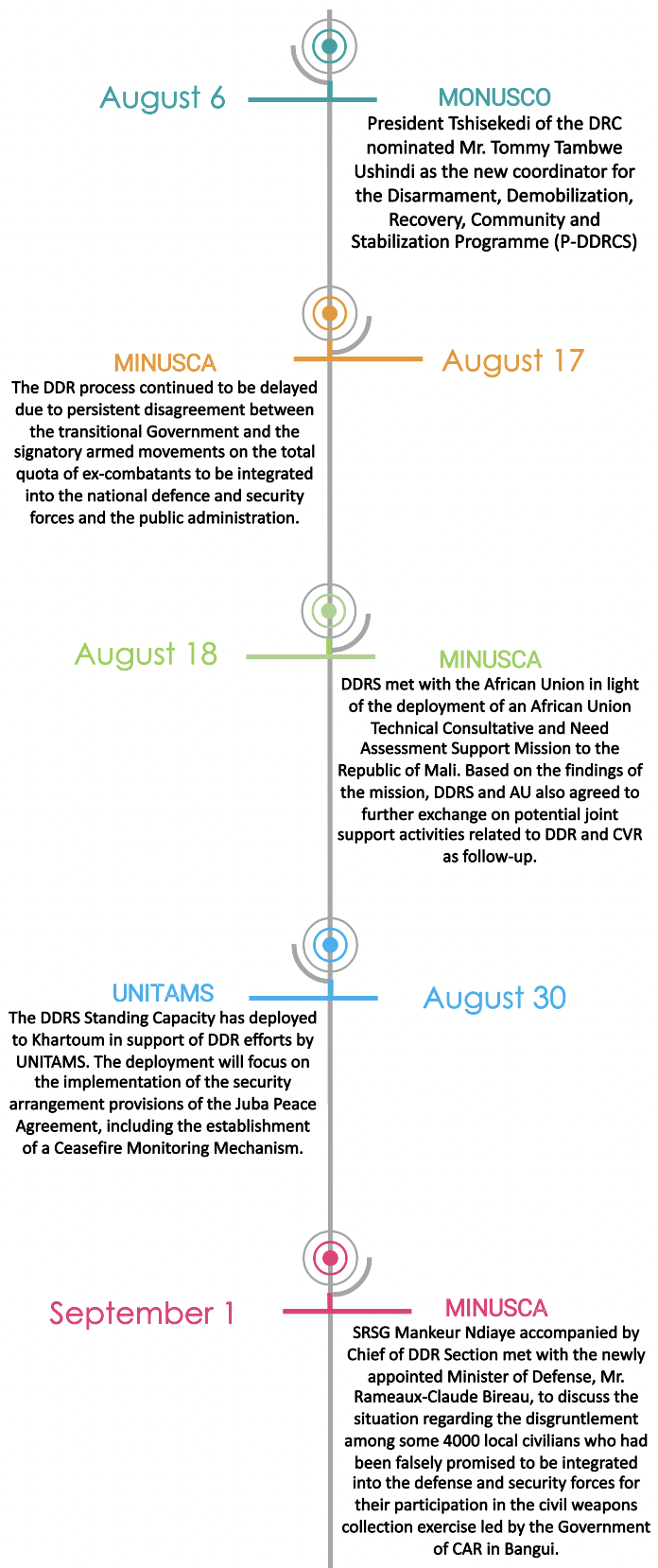
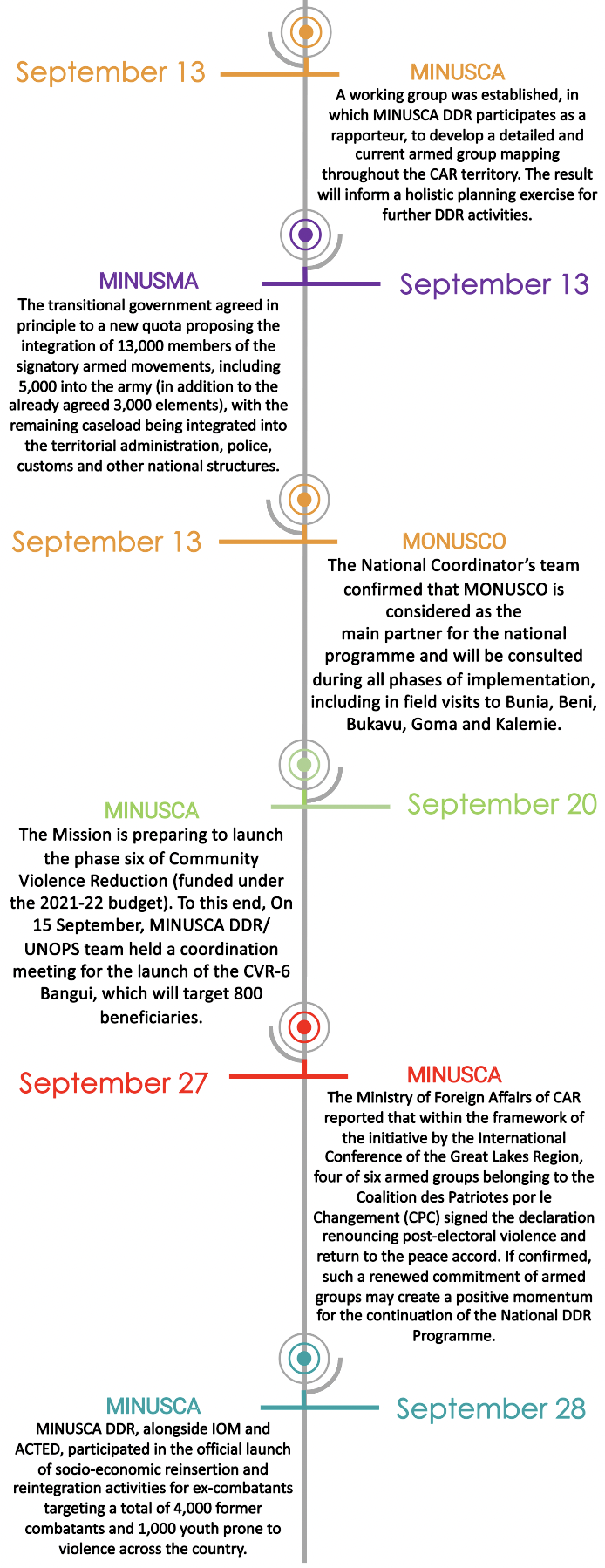
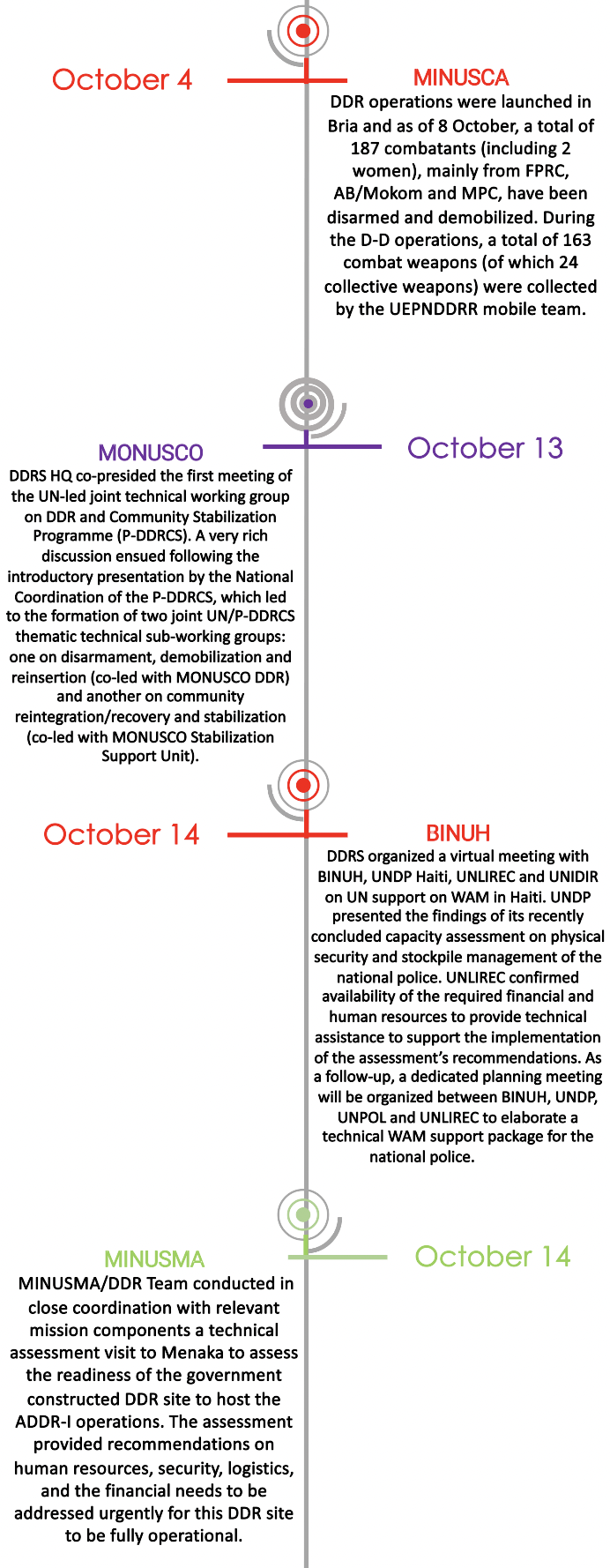
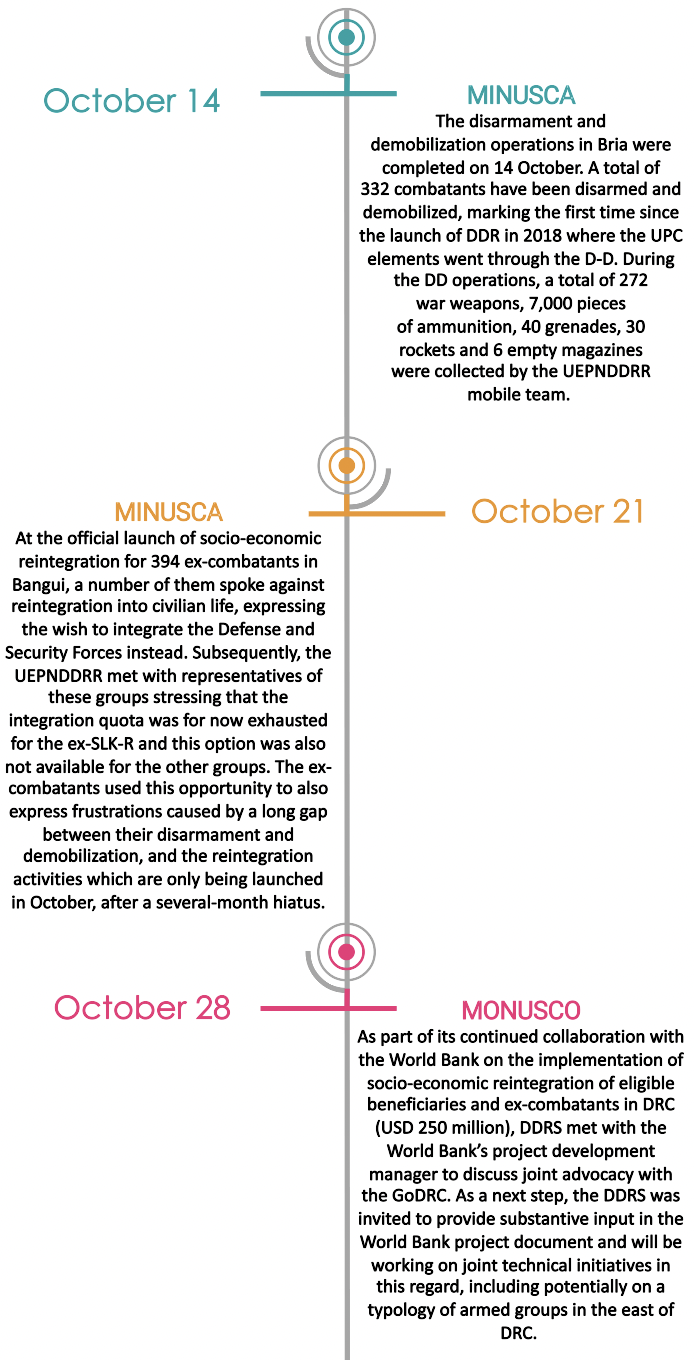
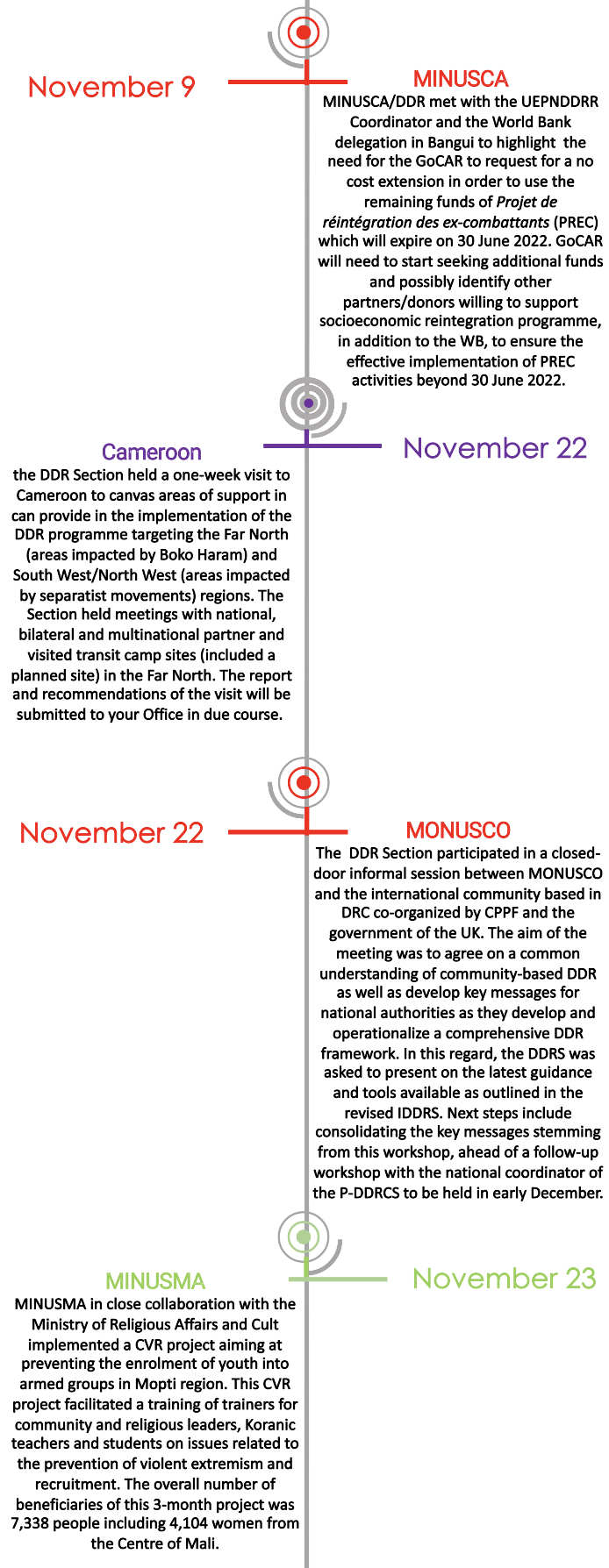
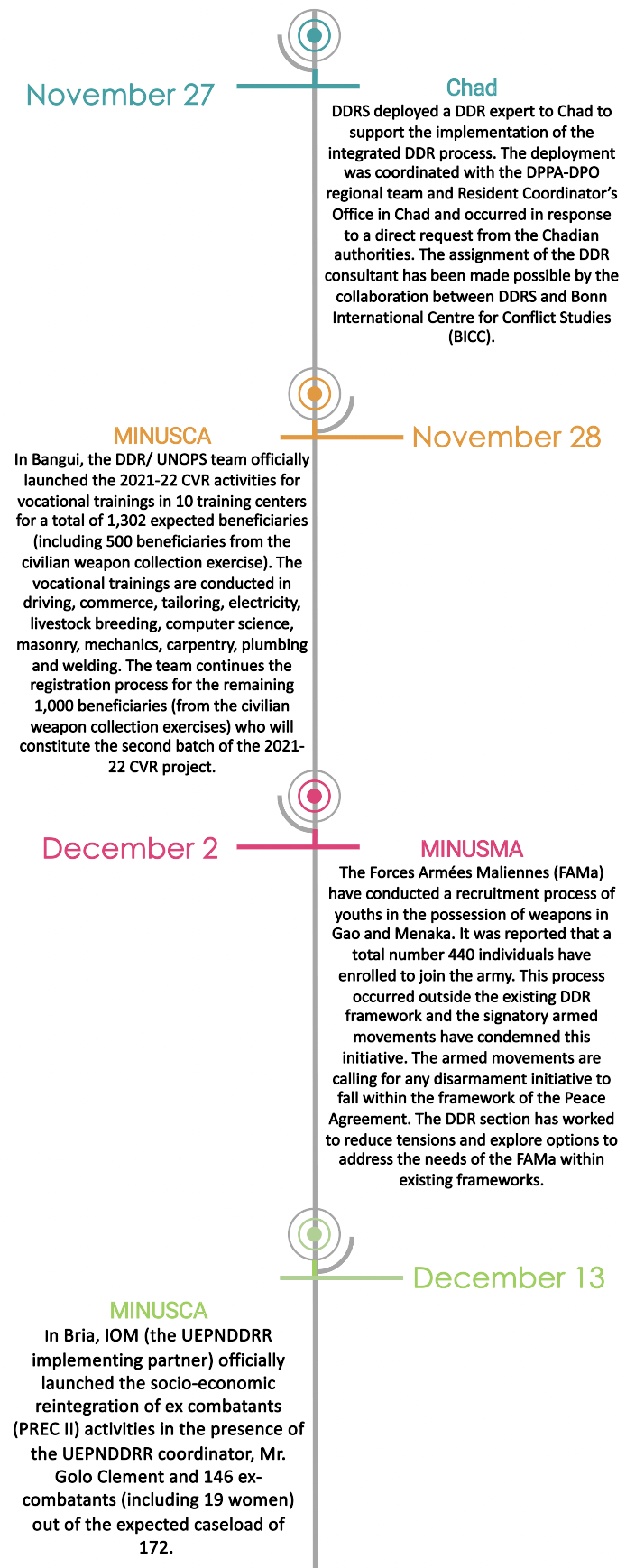
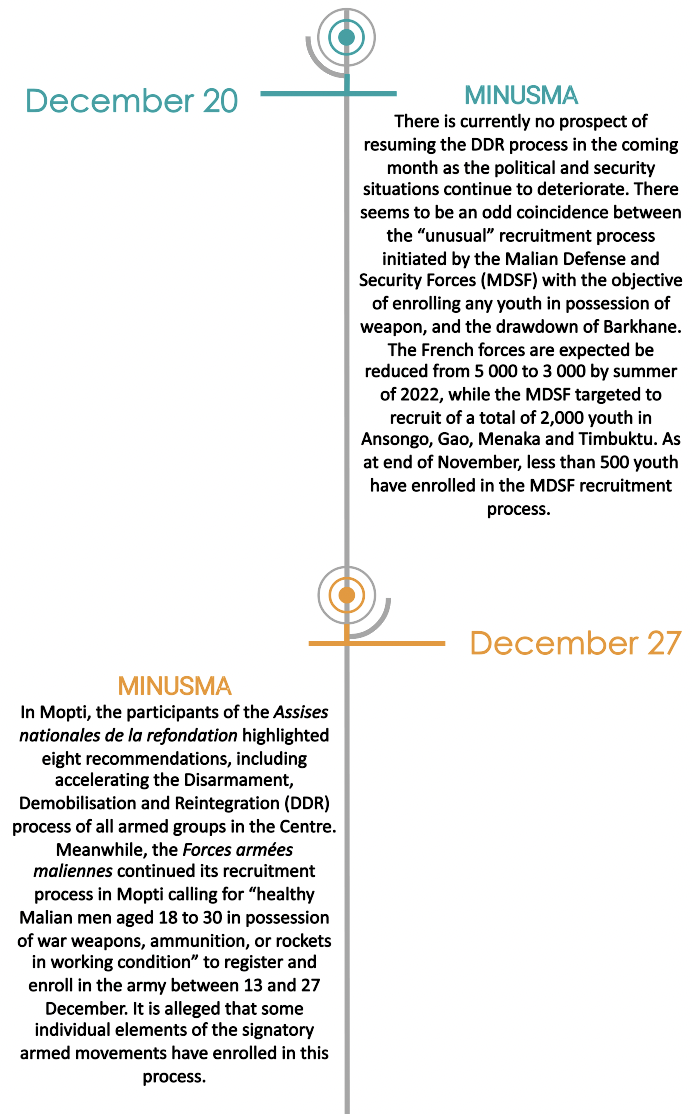
DDR & POLITICAL TRANSFORMATION
POLITICAL TRANSFORMATION OF ARMED GROUPS
“an unheralded pathway
to achieve
necessary change
through
non-violent means“
The following video is part of a series on political transformation developed jointly by the UN DPO DDR Section and Berghof Foundation. This workstream is part of a broader project which focuses on operationalizing the newly adopted Integrated Disarmament, Demobilization and Reintegration Standards (IDDRS) module 2.20 on Politics of DDR. The videos display how political transformation of armed groups is an important component to achieve necessary change through non-violent means as a pathway to sustainable peace and provide rare first-hand information about the challenges and hopes that are connected to the transformation from armed to non-armed political activity. In addition to the creation of this video series, the collaboration between the DDR Section and Berghof Foundation also comprises the planning of two events: the first one was held in Berlin on 7 December 2021 and focused on mediating the political transformation of armed groups and the second one, planned to be held in New York end of March 2022, will focus on individual experiences of combatants who underwent such transformation.
DDR AND Climate SEcurity
CLIMATE CHANGE AND DDR
The nexus between climate and environmental changes and security is a global phenomenon that continues to gain attention. The subject has been discussed by the Security Council and in the past year, a number of council members have convened signature events during their presidencies during which climate and security was the major focus of discussion. These members include Niger (September 2020), Saint Vincent and the Grenadines (November 2020) and the UK (February). The UN Secretariat and Agencies, Funds and Programs have also followed suit with many focusing on the ways in which climate exacerbates conflict risks. The correlation between climate and insecurity is not entirely clear but there is growing consensus that climate change is a risk multiplier, exacerbating drivers of tensions and conflicts.
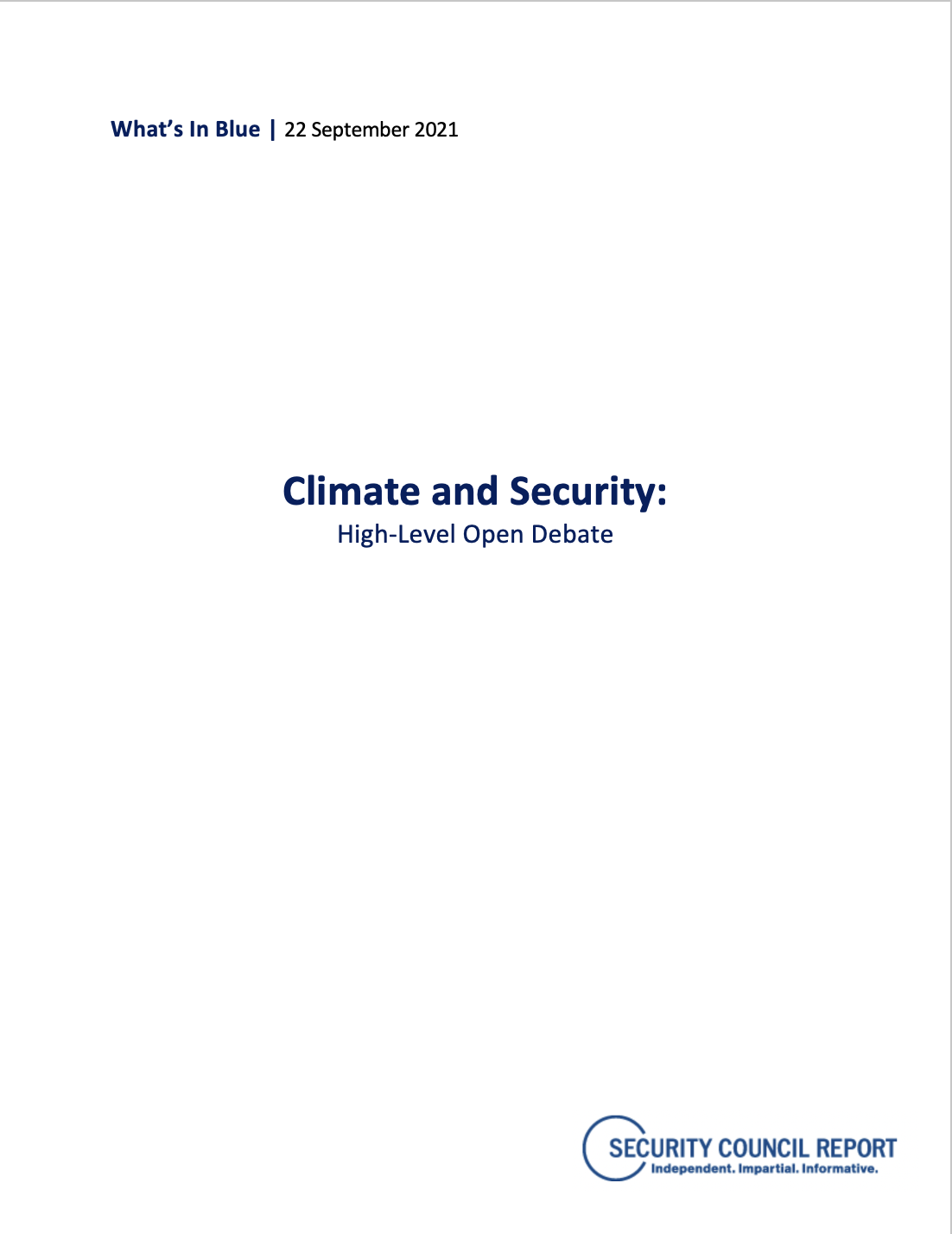
Organization for economic Co-operation and development (OECD) PROJECT
Over the last year, the DDR Section has also been committed to better understanding the interlinkages between spontaneous demobilization and potential reintegration opportunities in the artisanal mining sector in DRC.
Artisanal mining is among the largest sources of employment in the DRC, with up to 500,000 diggers reckoned to be in operation, generating income to support 5 million people. In addition, historical trends suggest clear linkages between the illicit exploitation of natural resources and its influence on conflict dynamics. Natural resources – or more specifically the illicit exploitation of the latter – have been at the core of the conflict in the DRC and most of the greed and grievances amongst armed group members, as well as their mobilization capacity, are directly linked to this dimension. Despite the illegal activities and illicit trade practices that have characterized it, the mining sector in the DRC remains the most profitable of the Congolese economy which suggest that it could be able to facilitate reintegration opportunities for ex-combatants.
Despite the links of armed group grievances and activities to the exploitation of natural resources in the DRC, none of the current and preceding DDR/RR programmes, including Community Violence Reduction initiatives, has looked into developing approaches that explore and capitalize on economic opportunities in the extractive industries in the DRC. It is with this potential for innovative programming in mind, that the DDR section has partnered with the OECD to generate the necessary evidence based on the experience of DDR and due diligence practitioners in the field through a research study. In this regard, preliminary evidence is promising. Field and literature review suggest that DDR programmes can also play a broader role, supporting mining trading centres, and working with local authorities to ensure labour protection measures and regulations. Furthermore, in the extractive sector, in particular, it may be possible for DDR programmes to promote due diligence, transparency, and accountability in the management of natural resources.
How? In the past, CVR programs have demonstrated the ability to stabilize the local security situation or promote social cohesion. The approach is also flexible and can differ greatly from one programme to another, adapting to local needs and opportunities. Due to its flexibility, CVR can be used in the field of natural resources. Other peacekeeping operations, such as those in Liberia, Darfur, and Lebanon, have also employed quick-impact initiatives that use natural resources to engage with local populations and build trust in the peacekeeping mission itself. However, there are also some risks associated. These include the long-term integration of community members into the extractive sector’s right of tenure; the need for equitable sharing of revenues and other benefits is also important to avoid grievances between ex-combatants and communities; labor conditions including health and safety; sustainable approaches and the need to future-proof such efforts through green-job creation.
Stay tuned to subsequent newsletters and public events as the OECD and DDRS continue to explore both the policy and operational opportunities linked to DDR and the small-scale artisanal sector.
VOICES OF FORMER COMBATANTS
HEAR FROM OUR MOST IMPORTANT PARTNERS
IDDRS Updates
The work on the Integrated Disarmament Standards (IDDRS) has continued. The modules in level three focus on practical guidance for the planning, design, and assessment of DDR programmes, including such pertinent questions as budgeting, staffing and the relation with national institutions. They, therefore, have a significant concrete impact on the work of DDR practitioners in the field, and their validation is highly anticipated.
The IDDRS are a comprehensive and detailed set of policies, guidelines and procedures for undertaking DDR. They cover over 30 thematic areas within DDR, ranging from planning, design, monitoring and evaluation through the protection of specific needs groups, such as children, youth and women and mainstreaming of cross-cutting issues, such as health, HIV/AIDS, gender and youth, to linkages with other processes, such as security sector reform (SSR) or transitional justice (TJ). The IDDRS are a repository of lessons and best practices drawn from the experience of all UN entities involved in supporting DDR and are always the subject of broad consultation before becoming accepted as guidance.
IDDRS Modules Status
IN PROGRESS
TO BE VALIDATED
COMPLETED
level 1
General IDDRS
module1.10
Introduction to the IDDRS
module1.10
Glossary: Terms and Definitions
level 2
Concepts, Policy and Strategy of the IDDRS
module2.10
The UN Approach to DDR
module2.11
The Legal Framework for UN DDR
module2.20
The Politics of DDR
module2.30
Community Violence Reduction
module2.40
Reintegration as Part of Sustaining Peace
level 3
Structures and Processes
module3.10
Integrated DDR Planning: Processes and Structures
module3.11
Integrated Assessments
module3.20
DDR Programme Design
module3.21
Participants, Beneficiaries, and Partners
module3.30
National Institutions for DDR
module3.40
Mission and Programme Support for DDR
module3.41
Finance and Budgeting
module3.42
Personnel and Staffing
module3.50
Monitoring and Evaluation
level 4
Operations, Programmes and Support
module4.10
Disarmament
module4.11
Transitional Weapons and Ammunition Management
module4.20
Demobilization
module4.30
Reintegration
module4.40
UN Military Roles and Responsibilities
module4.50
UN Police Roles and Responsibilities
module4.60
Public Information and Strategic Communication in Support of DDR
level 5
Cross-cutting Issues
module5.10
Women, Gender and DDR
module5.20
Children and DDR
module5.30
Youth and DDR
module5.40
Cross-border Population Movements
module5.50
Food Assistance in DDR
module5.60
HIV/AIDS and DDR
module5.70
Health and DDR
module5.80
Disabilities and DDR
level 6
Linkages
module6.10
DDR and SSR
module6.20
DDR and Transitional Justice
module6.30
DDR and Natural Resources
module6.40
DDR and Organized Crime
module6.50
DDR and Armed Groups Designated as Terrorist Organisations
RECENT PUBLICATIONS
MOST RECENT PUBLICATIONS
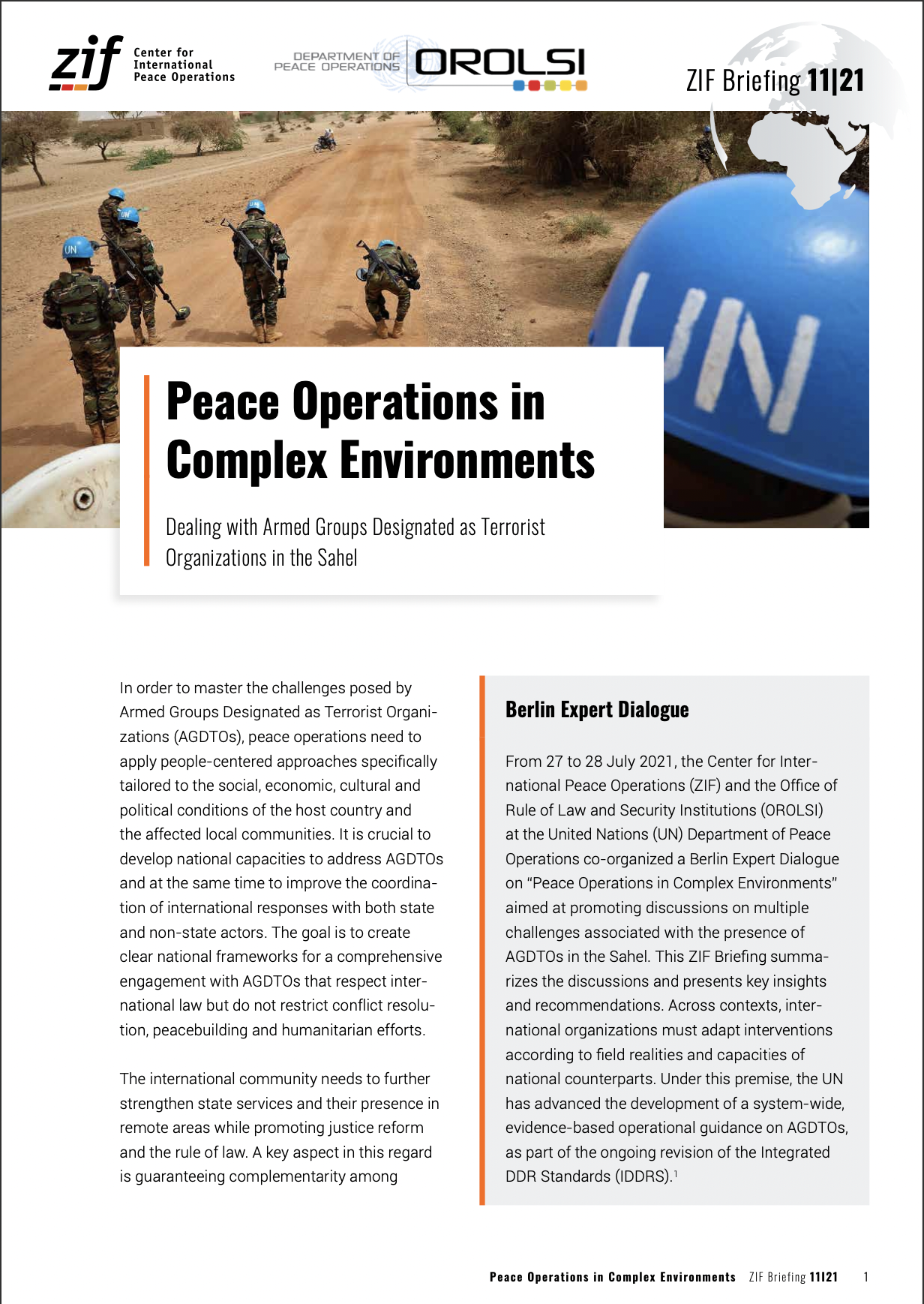
In recent years, UN peace operations have increasingly been operating in complex environments where armed groups designated as terrorist organizations (AGDTOs) are active. This has created political, organizational and practical challenges, which require new approaches and innovative solutions.
To contribute towards addressing these issues, the Center for International Peace Operations (ZIF) and United Nations Department of Peace Operations co-organized a Berlin Expert Dialogue on “Peace Operations in Complex Environments”, aimed at promoting discussions on dealing with AGDTOs in the Sahel. The event brought together a wide range of experts in this field.
To share the event’s key messages with a broader audience, the report “Peace Operations in Complex Environments – Dealing with Armed Groups Designated as Terrorist Organizations in the Sahel” has been developed. The document highlights how international organizations must adapt interventions and ensure complementarities according to field realities and national capacities – in particular by implementing conflict-sensitive and context-specific measures. To improve coordination among UN actors, the report reiterates the importance of developing a system¬wide, evidence-based operational guidance on AGDTOs, as part of the ongoing revision of the Integrated DDR Standards (IDDRS).
OTHER PUBLICATIONS
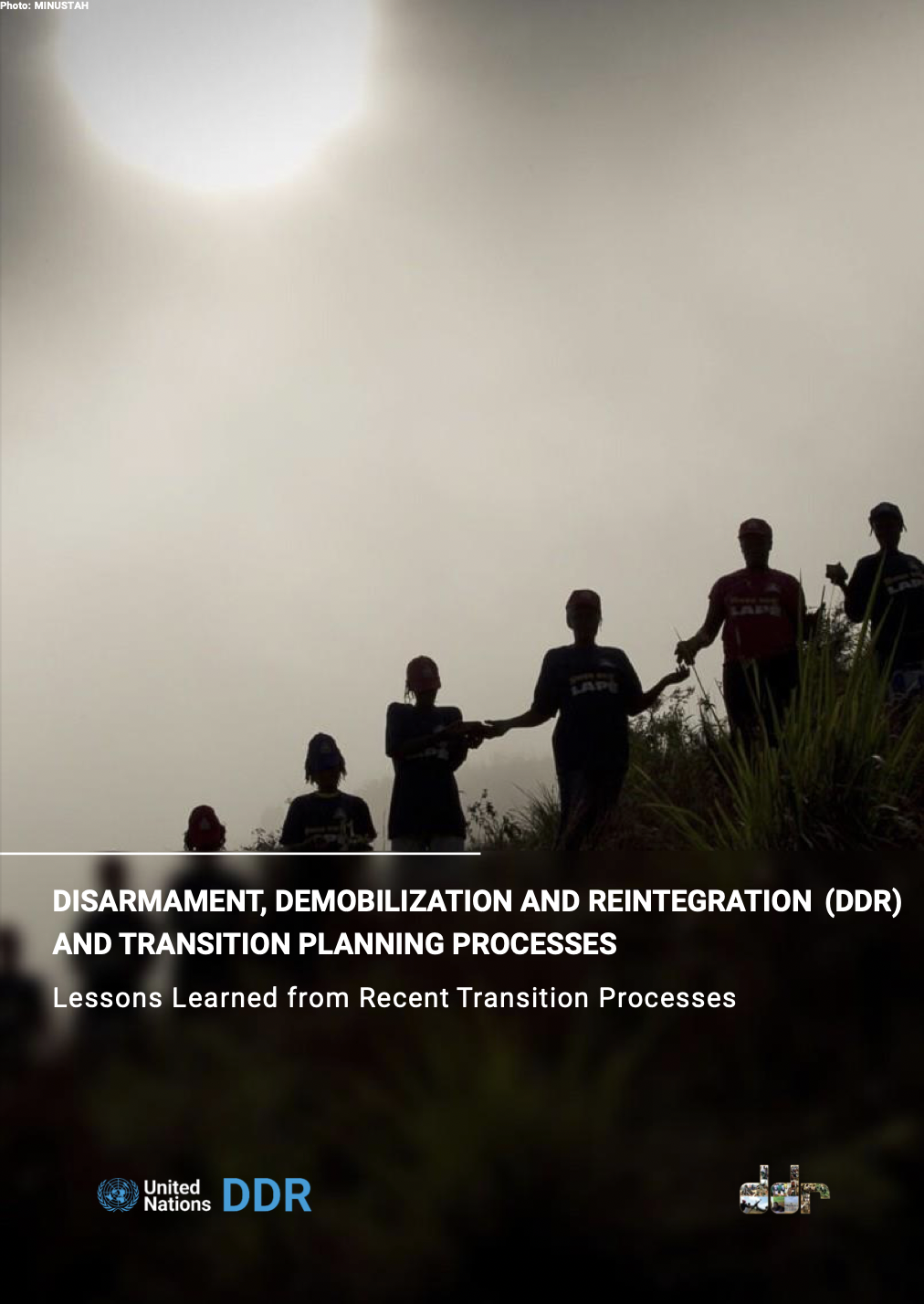
DDR and Transition Planning Process
Lessons Learned from Recent Transition Processes
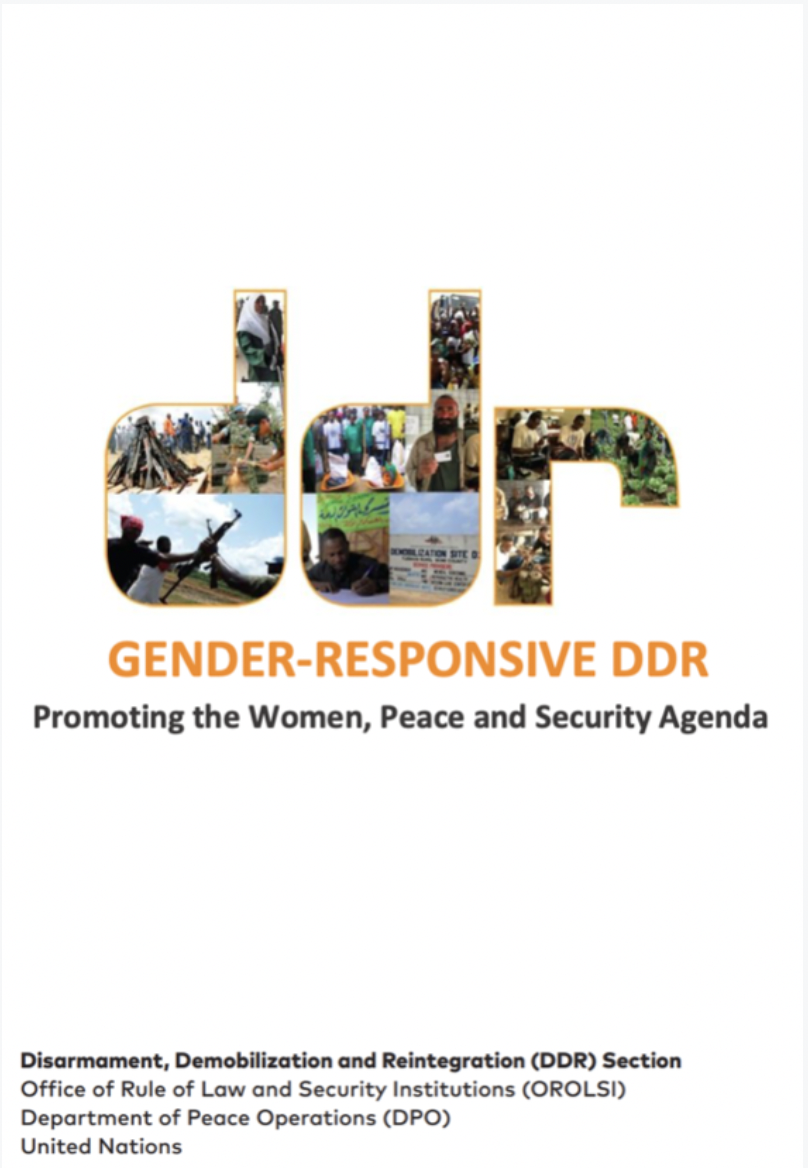
Gender-Responsive DDR
Promoting the Women, Peace and Security Agenda
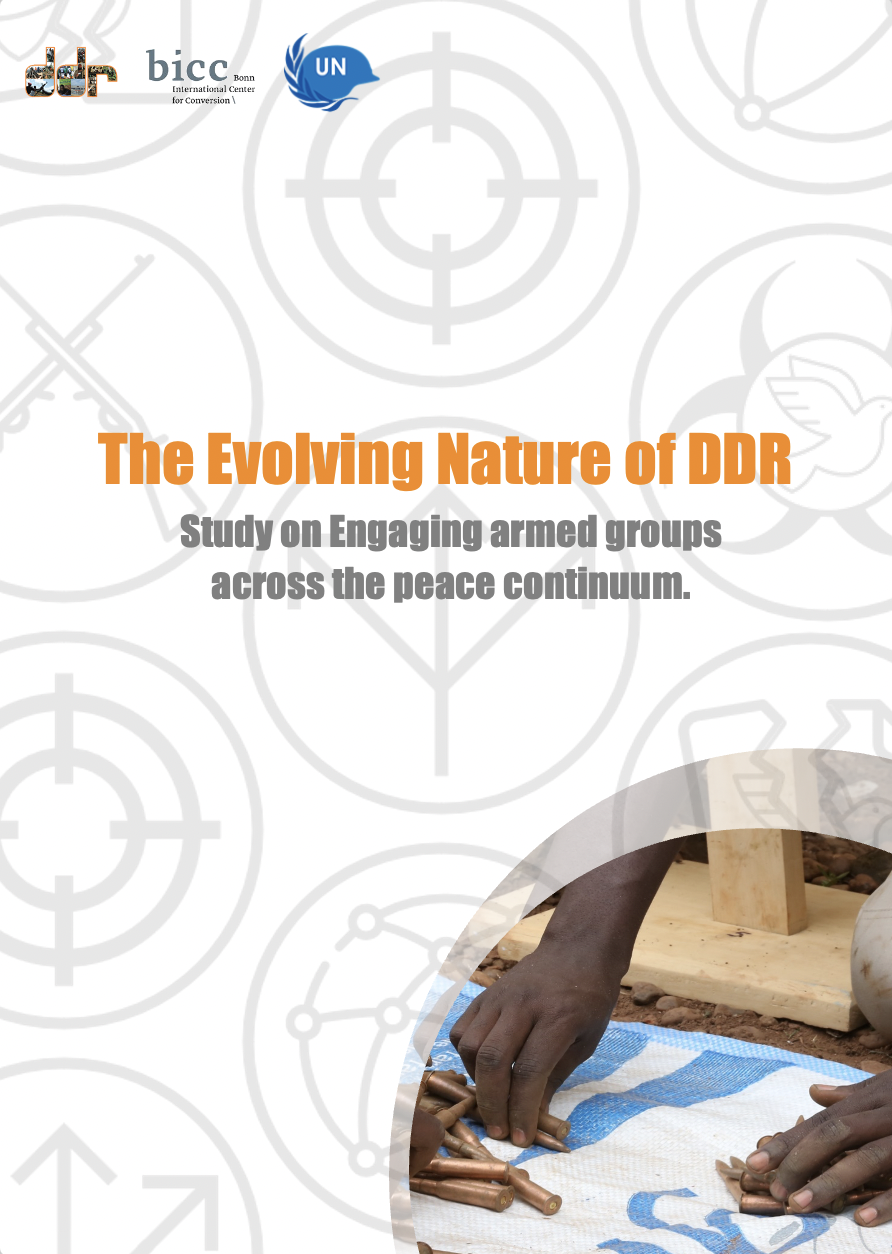
The Evolving Nature of DDR
Study on Engaging Armed Groups across the Peace Continuum
Upcoming
Training Opportunities
Regular training opportunities are vital to ensure that staff is equipped with the skills and knowledge to address ever-changing challenges effectively. Upcoming opportunities include:
Désarmement, Démobilisation and Réintégration (DDR)
Training provider: School of Peacekeeping Alioune Blondin Beye (EMPABB)
Format: In person, Bamako (Mali)
Date: 31 January- 11 February 2022
Link: https://www.empbamako.org/Ev%C3%A9nement/ddr-1-22/
Disarmament, Demobilization and Reintegration Foundation Course (DDRF 22)
Training provider: Kofi Annan International Peacekeeping Training Centre (KAIPTC)
Format: In person, Accra (Ghana)
Date: 7-18 February 2022
Link: https://www.kaiptc.org/kaiptc-course/ddrf22/
Community Violence Reduction (CVR) Course
Training provider: Department for Peace Operations (DPO)
